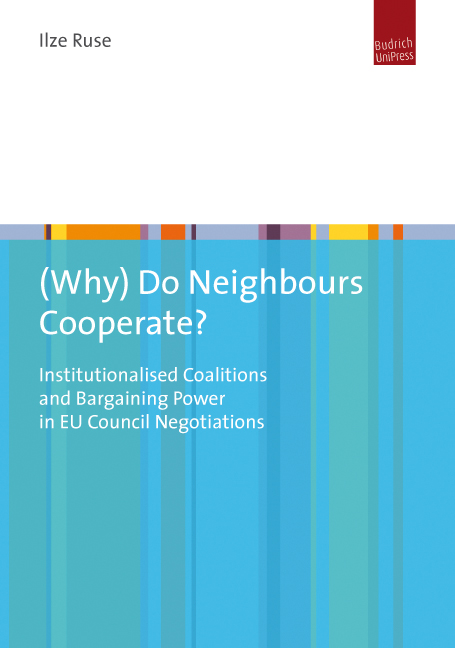Informationen zum Buch
Startseite » Programm » (Why) Do Neighbours Cooperate?
(Why) Do Neighbours Cooperate?
Institutionalised Coalitions and Bargaining Power in EU Council Negotiations
Erscheinungsdatum : 18.12.2012
16,99 € - 29,90 €
Beschreibung
Negotiations in the European Union Council of Ministers are not only taking place within formal decision-making structures. Member states strive to find allies and coordinate their positions prior to formal negotiation meetings. They either create ad hoc coalitions to pool voting power or cooperate within more durable, institutionalised coalitions that traditionally form due to geographical proximity or among like-minded member states as task-specific coalitions on particular issues. Institutionalised coalitions bestow their members with a bargaining advantage even if they cannot generate enough voting weight to reach voting thresholds.
The Author:
Dr Ilze Ruse,
Dr phil in Political Science, lecturer at Riga Graduate School of Law, Latvia
Target Groups: graduate and postgraduate students, junior and senior scholars and academics of European Studies and Political Science
Keywords: European Studies, EU, voting, negotiations
Departments: Political Science, European Studies
Zusätzliche Information
| Verlag | |
|---|---|
| ISBN | 978-3-86388-029-3 |
| eISBN | 978-3-86388-184-9 |
| Format | A5 |
| Umfang | 196 |
| Erscheinungsjahr | 2013 |
| Erscheinungsdatum | 18.12.2012 |
| Auflage | 1. |
| Sprache | Englisch |
Autor*innen
Beschreibung
Beschreibung
Negotiations in the European Union Council of Ministers are not only taking place within formal decision-making structures. Member states strive to find allies and coordinate their positions prior to formal negotiation meetings. They either create ad hoc coalitions to pool voting power or cooperate within more durable, institutionalised coalitions that traditionally form due to geographical proximity or among like-minded member states as task-specific coalitions on particular issues. Institutionalised coalitions bestow their members with a bargaining advantage even if they cannot generate enough voting weight to reach voting thresholds.
The Author:
Dr Ilze Ruse,
Dr phil in Political Science, lecturer at Riga Graduate School of Law, Latvia
Target Groups: graduate and postgraduate students, junior and senior scholars and academics of European Studies and Political Science
Keywords: European Studies, EU, voting, negotiations
Departments: Political Science, European Studies
Bibliografie
Zusätzliche Information
| Verlag | |
|---|---|
| ISBN | 978-3-86388-029-3 |
| eISBN | 978-3-86388-184-9 |
| Format | A5 |
| Umfang | 196 |
| Erscheinungsjahr | 2013 |
| Erscheinungsdatum | 18.12.2012 |
| Auflage | 1. |
| Sprache | Englisch |
Produktsicherheit
Bewertungen (0)
Bewertungen
Es gibt noch keine Bewertungen.









Bewertungen
Es gibt noch keine Bewertungen.